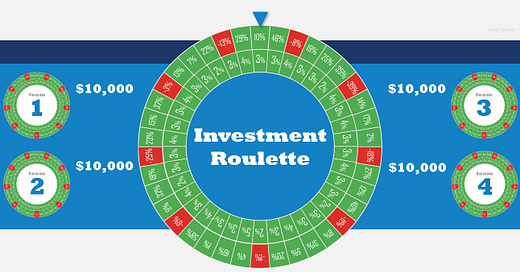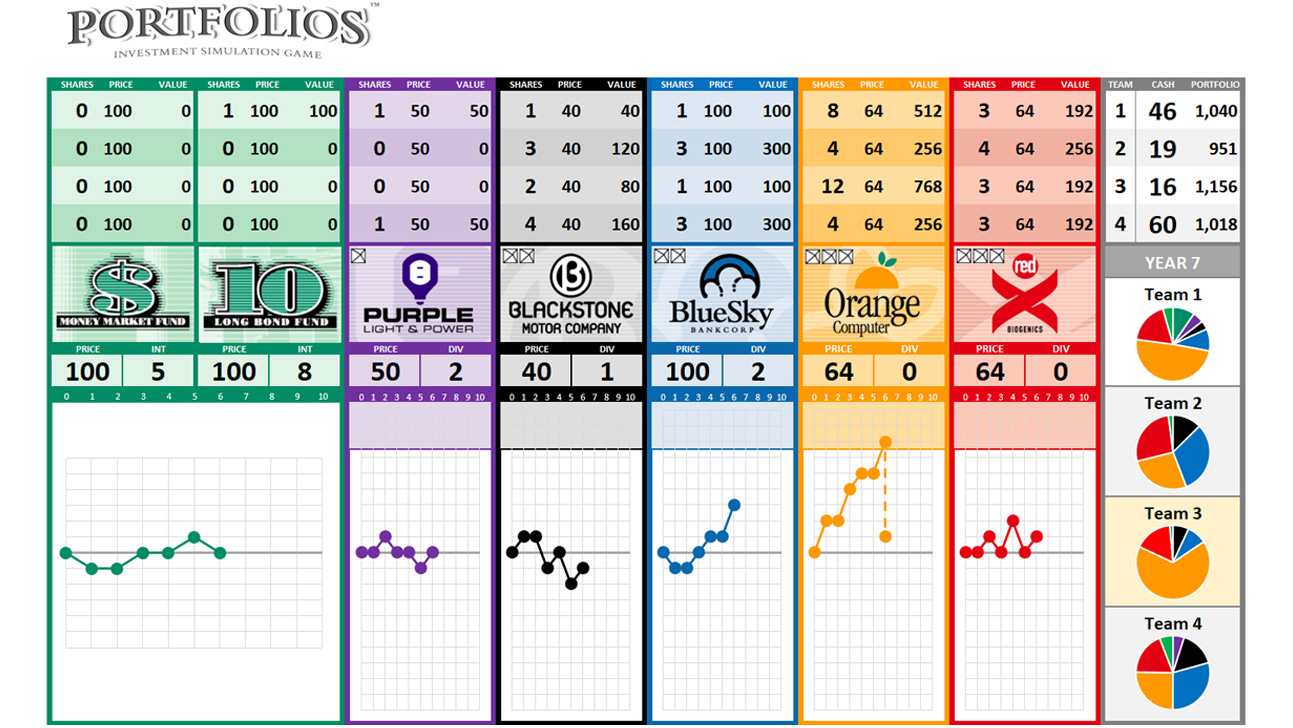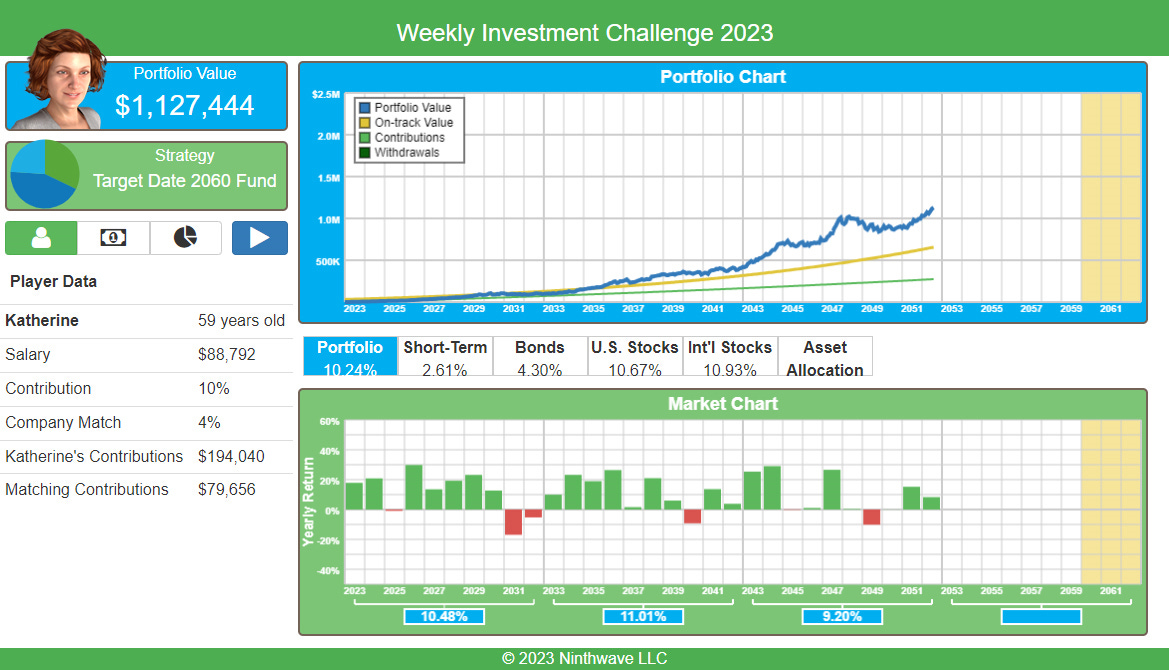Our Programs
We have been creating in-person and online learning experiences for over twenty years. All of these sessions are highly engaging. For more information on any of these sessions, please contact us and we’d be happy to arrange a demo and answer any questions you have.
Investment Roulette
In-person (20 – 120 participants). Time: 1 hour
Audience: Corporations, adults, high school and university students, professional and amature athletes, church groups, clubs, foundations
Investment Roulette is a highly engaging, in-person session, suitable for high school through adult audiences. The session works well as a team-building event as well as serving as a high-impact learning experience for anyone, regardless of prior investment experience.
Groups of 20 to 60 participants are divided into 4 teams. We can accommodate larger groups with a modified version using smaller teams.
The session has two parts. We start with the Investment Roulette game in which the teams make investment choices with intentionally limited information.
Unique Investment Return Wheels represent the historically plausible returns for three investment options (Outer Wheel, Inner Wheel, and Fifty-Fifty). Teams indicate their choice prior to the each spin and their portfolio results are updated based on the result of the spin. The game consists of 10 spins, representing 10 years of investing.
The session then moves to part 2, the Trivia Round, in which teams explore what they just experienced and begin to learn more about key investing topics, including risk, return, compounding, the stock market, interest rates, money market funds, and asset allocation. Teams are awarded points for correct answers.
Much of this information dispels common investment myths and the knowledge learned has the dual purpose of explaining how investors can make more money over time while incurring less financial stress—our more money; less stress promise.
At the end of the session, the hosting organization can provide prizes to members of the winning team.
Corporate testimonial:
The recent financial wellness session for 100+ store managers in the Cincinnati area was a huge success. Led by Stuart and Sharon, the event effectively broke down complex investment and stock market navigation strategies, making them accessible for the average investor. The interactive and competitive format kept attendees highly engaged and made it an excellent team-building experience.
Stuart and Sharon's expertise received high praise, making this an enriching event for all. We look forward to hosting similar financial literacy sessions for our store leaders in the future. The engaging and competitive format was well-received, with attendees showing great interest throughout the session.
Joe Lay, Division Labor Manager, The Kroger Company
Investment Roulette - Interactive Streaming Version
Virtual (up to 40 participants). Time: 45 minutes to 1 hour
Audience: High school and university students.
We are pleased to introduce an interactive streaming version of our Investment Roulette session for high school and university students. The goal is to offer a version that can be leveraged to impact more students.
The class is divided into four teams, each with a designated captain. The teacher only needs to input the choices for each team and the program does the rest.
Interested teachers can contact us at scrickmer@gmail.com to request a link to the program.
High school testimonial:
As Chair of the Leo H. Gerbus '53 Center for Entrepreneurship and Innovation at St. Xavier High School, I’ve had the pleasure of working with Stuart and Sharon Crickmer in the classroom, where their expertise in investing, portfolio-building, and financial literacy has been invaluable. Their new online simulation program maintains that same high standard of excellence. I recently used it with my students, and it was fantastic, engaging, accessible, and incredibly effective at building real financial skills. I highly recommend it to any school or organization seeking top-tier financial literacy education.
Timothy “Mac” McDonald
Chair of Entrepreneurship & Innovation
The Leo H. Gerbus ’53 Center for Entrepreneurship & Innovation
Portfolios Investment Simulation Game
In-person (20 – 60 participants) Time: 1 hour
Audience: Corporations, adults, high school and university students, professional and amature athletes, church groups, clubs, foundations
This session is an excellent follow-up to the Investment Roulette session.
The Portfolios Investment Simulation Game is, essentially, practice reps for investing. Four teams compete to manage a portfolio of stocks, bonds, and a money market fund over a simulated 10-year period. Teams buy and sell investments to set their asset allocation at the start of each game year, collect interest and dividends, and then simulate changes in interest rates and the prices of individual game stocks by rolling special dice (including the possibility of stock splits). This is a highly engaging learn-by-doing experience. Teaching points are made dynamically based on the flow of each unique game.
At the end of the game, the results of the Portfolios Stock Index can be compared to the most closely matched decade from real stock market history (S&P 500).
High school testimonial:
I met Stuart and Sharon Crickmer about a decade ago when they introduced me and my high school students to their Portfolios investment simulation. This simulation quickly became the highlight of my courses as students continually raved about the opportunity to learn more about investing in a very safe but competitive and engaging environment.
Over the years, Stuart and Sharon developed many other programs – all intended to help others learn more about basic investing principles. Whether they are working with NFL players, high school students or a company’s employees, they are focused on creating engaging content with specific learning outcomes. Trust me – keeping a classroom of thirty high schoolers engaged is quite a feat!
Even duringCovid, they pivoted their programming and developed new ways to deliver their message virtually. Stuart and Sharon are delightful to work with and approach all that they do with energy and professionalism. They have a knack for connecting and educating all kinds of people – from kids to adults. They make investing easy to understand and FUN!
Susan Bailey
Assistant Director – Career Services
Lindner College of Business, University of Cincinnati
Portfolios - Interactive Streaming Version
Virtual (up to 40 participants). Time: 45 minutes to 1 hour
Audience: High school and university students.
We are pleased to introduce an interactive streaming version of our Portfolios session for high school and university students. The goal is to offer a version that can be leveraged to impact more students.
The class is divided into four teams, each with a designated captain. The teacher only needs to input the choices for each team and the program does the rest.
Interested teachers can contact us at scrickmer@gmail.com to request a link to the program.
Weekly Investment Challenge
Online (unlimited participants) Time: 5 – 10 minutes per week for each of 4 Weekly Challenges
Audience: Corporation 401(k) plan participants, high school and university students
The Weekly Investment Challenge is designed primarily for a corporate 401(k) audience. It is ideally suited for inclusion in a company’s financial wellness month. It has also been integrated into high school and university financial literacy courses.
Participants log into the site using their company or school email address. A list of participants is provided securly to the client at the end of the Challenge in the event the company, teacher, or professor wants to award participants for participation.
Each Week in the Challenge provides a brief and engaging introduction of a key investment topic. Weeks 1 - 3 are typically updated each year. The screenshots below are from the 2023 version of the Challenge.
Week 1 begins with a Leonardo Da Vinci quote that essentially says, if you’re going to make smart decisions about something, you need to first understand it. Exercises in perception lay the groundwork for a unique way to visualize what to expect when investing in the stock market (including understanding what you’re investing in) and explain why investing is the opposite of gambling.
Week 2 starts by suggesting that the questions you ask when planning a trip (Where am I going? When and for how long? etc.) can also be used to help plan life events, like retirement. An exercise of successively guessing the value over time of a one-time investment earning 10% per year is used to introduce compounding, a key component of answering the question: How do I get there?
Week 3 takes a closer look at one of the most misunderstood concepts in investing: risk. Exercises in evaluating risk over different time periods establish that the least risky investment is different for different time periods and that viewing the risk of long-term investments through a short-term lens can lead to overreactions, making it harder to achieve your long-term retirement goals.
Week 4 pulls together the lessons from the first three weeks and allows participants to “experience” long-term investing through an interactive Investment Simulation, customized to match the key provisions of the company plan.
Sample participant comments:
I do not understand the basics of stocks. This was a simple and easy to follow guide and also had nice visuals to help me grasp the concepts.
Great use of perception, haven't seen this before w/ financial education.
The use of the artwork to make various points was an interesting and enjoyable way of learning.
Awesome to see the money grow visually on the charts. Thanks! I'm sending this to my 30-year-old niece.
The weekly investment challenges make me feel more confident in my 401k investing. It can be frustrating seeing my stocks fall but they do eventually rebound. I need to stay the course and remain confident that my investments will grow much more as the years go on.
Oh my goodness! I am way too excited that this simulator is back. I don't know why but it is so fun and enlightening-that's probably why I like it so much. It can provide a little confidence in your choices as well as help to discern how I should plan investments.
Corporate HR testimonial:
The weekly investment challenge has been a major component of our annual 401(k) educational campaign. This campaign is a month of educational programs for our employees centered on the 401(k) plan and financial wellness. Working with Stuart, he has created an innovative approach to providing investment concepts to our non-highly compensated employees. Stuart creates a collaborative environment with Plan Sponsors where the areas of investment, savings, and concepts of 401(k) plans are discussed prior to development. Each year, we meet with Stuart and discuss these areas of focus. Then, Stuart incorporates these areas into interactive programs that are visual, educational, and relevant. We have found that our employees appreciate the educational approach, and more importantly take action. The result is increased savings, diversification of participant accounts, and employees deferring into the 401(k) plan who were not previously participating. Stuart brings great knowledge of the investment industry to practical application for educational guidance to our employees. He cares about the product he develops and each year the results we achieve through his interactive educational models are impressive. We have a long standing business relationship with Stuart and highly recommend his educational services for Employers looking for a proven approach to taking complex investment concepts to a broader employee base.
Kevin Barry, Director, Retirement Plans and Financial Wellness Programs, First American Financial
University testimonial:
I am happy to provide an enthusiastic letter of support for the use of the weekly online Investment Challenge modules. Now that I have used your modules of the investment simulation online program in several different courses over several years, it is clear that this is an optimal method of instruction to get students enthusiastic about investing while also teaching them important core concepts about understanding risk over the long-term in retirement planning. In particular, students felt like the hands-on activities as part of these modules allow for active learning that is best practice in acquiring new knowledge. Students can try out different ways to invest and then learn the impact of those decisions (and the emotions that occur while gaining and losing money), while not actually making those errors in real life with real money. Importantly, students are extremely positive about the use of the weekly modules. They make comments on course evaluations about how the Psychology of Money class was one of the most valuable classes in their college career. The active learning is critical to this enthusiastic student feedback. I am familiar with so many ways to do professional development and this is by far the best approach that I have seen.
Cecile A. Marczinski, Ph.D., Regents Professor & Department Chair
Department of Psychological Science, Northern Kentucky University
University student comment:
After the interview and learning more about the stock market, I presumed that I would have a general idea as to what to expect from this practice simulation. However, I was blown away by the results. The individual that I chose only had a salary of $40,000 a year, which is somewhat average in the United States. Seeing the snowball effect across such long stretches of time really helped to put into perspective the true value of investing. I knew that investing was important, but it's very difficult to wrap one's head around a concept that proves itself across decades of life. While the activities provided through this program may not be a fully accurate representation of my personal financial future, the combination of satisfying visuals and insightful notes throughout helped me to gain a general understanding as to why it is imperative to plan for retirement. Upon reading the article as well as running through the simulation program, it begins to make more sense as to why stress is so common in regard to money. Obviously, money itself is somewhat stressful (as it essentially controls most of what we do in modern society) but when someone looks at the market in the short term, which is the easiest way to look at it, it feels impossible to know what it will do next. This can be very confusing and stressful. It is much like a pointillist art piece; up close, it appears to be a grouping of chaotic dots, but once you take a moment to step back, the image becomes clear. (in this case, the long-term benefits of investing).
More Information
For more information, please contact us at scrickmer@gmail.com
Stuart & Sharon








